- Home
- Mack Reynolds
Equality: In the Year 2000 jw-2 Page 17
Equality: In the Year 2000 jw-2 Read online
Page 17
They checked out every room in the Leete quarters. They located bugs in the living room, the kitchenette, the dining room, in the bedroom of Martha and Raymond Leete, and in his study. There were none in Edith’s room, nor any in the baths or the hallway.
When they were done, they returned to the living room. Academician Leete’s face was set in an expression of absolute astonishment.
Julian said, keeping his voice level, “Oh, by the way, I have something in my apartment I want very much to show you. Have you time to drop by?”
“Of course, Julian.”
On the way down the hall, Leete whispered, “Can we talk out here?”
“I would think so, but I’m not sure. Hold it for awhile.”
In the West apartment, they went through the same routine. In the living room, even as he began to explore with the mop, Julian said, “Can I get you a drink?”
“Why, I wouldn’t mind a glass of Moselle.”
“I think I’ll have my usual Scotch and soda. Here, I’ll dial them.”
He pointed at the auto-bar and while Leete went through the routine of getting their drinks, Julian continued mopping his quarters.
As he searched, he kept up the former trend of their conversation. “What would you say the present socioeconomic system could be called?”
Leete waired a moment, as though considering the question. “Actually,” he said, “I rebel against labels—capitalism, feudalism, socialism, communism, liberalism, technocracy.” He snorted in deprecation. “I even rebel against the use of our back-patting term Republic of the Golden Rule. It’s all a great deal of nonsense. Society is in a continual state of flux. Under the chattel slavery system of Greece, and later on, you had a certain amount of feudalism, and you even had an emerging capitalist class. What do we have today? Once again, I rebel against labels, but I suppose if you must have terminology, I would say…” he hesitated, “…well, I would say we have somewhat of a combination of syndicalism, socialism—the DeLeonist type—technocracy, and meritocracy, as that brilliant Englishman Michael Young called it.”
Julian’s mop began to buzz. He traced it down. The bug was neatly located immediately below his phone screen, right on his desk.
He said, “Meritocracy? That’s a new one for me. It must have come along after I went into hibernation.”
He went on into his bedroom, and Leete, now completely aware of the game though not quite understanding it, continued to talk.
“I’m not sure when he wrote his book. I think it was entitled The Rise of the Meritocracy. You can look it up at your leisure in the International Data Banks. He foresaw something like our present Aptitude Quotient. I think his formula was I.Q. plus effort equals merit. As I recall, he projected himself into the year 2034 A.D. His basic idea was that even in his day it was no longer enough to be somebody’s nephew to obtain a reasonable post in society. Under Meritocracy, experts in education and selection apply scientific principles to sift out the leaders. In a word, you must show ‘merit.’ Then he asks the question, is this an undivided blessing?”
Julian had returned to the living room after completely exploring his apartment. He went over to his desk and upended the phone screen. Then he took his small pocket knife out and regarded the bug for a long quizzical moment. He opened the knife and carefully pried the listening device off—it had been held onto the surface by a suction cup—and examined it carefully.
In his time, in the cutthroat field of international finance, Julian West had often had his phones tapped, his quarters bugged, and, in turn had done the same to his rivals. However, he himself was not up on the mechanics of the thing. There were experts to be hired for such matters, private detectives and such. He had long had, on full-time retainer, two former C.I.A. men.
There were two tiny screws on the surface. Using the small blade of the knife, he carefully unscrewed them, while his companion continued to watch him. The top came off and inside was a wonder of miniaturization which he understood not at all. He thought about it for awhile, deciding finally that almost anything he did would destroy its effectiveness. But that wasn’t all that he wanted; when somebody came to check out why the bug had become inoperative, he didn’t want it to appear as though it had been tampered with. With a shrug he inserted the small blade of the knife under a tiny disk and pried it free.
Then he put the top on the bug and screwed the tiny screws back into place. He returned the device to its exact original position, and then replaced the phone screen.
He turned to Dr. Leete. “All right, there was only the one bug in my place. I’ve bollixed it: we can talk.”
“Should we return to my apartment and do the same to those?”
Julian shook his head. “Whoever is monitoring your apartment—and mine—would be irritated, but not surprised, if one of the bugs became inoperative. The things are delicate. But if all of them suddenly failed to transmit, then they’d know they’d been discovered and would figure out some new method of tapping you—tapping us. Leave the bugs in your apartment, warn Martha and Edith about them, and simply watch what you say.”
The other was completely out of his depth. “But who would care what any of us say?”
Julian sighed. “I suspect you know. Or, at least, I suspect that you suspect. The other day, after you’d had your two run-ins with the young hoodlums, Edith suggested you get in touch with Security and report the incidents. But you clammed up. Why?”
Leete was irritated. He said, finally, “Julian, though you have been literally cramming new information ever since we revived you, there are still a million-fold matters you do not understand.”
Julian was not above impatience himself. “As I am fully aware of, Raymond; however, there are some fields in which you people today are babes in the woods compared to me. Now, who are the people down enough on you to bug your apartment and attack you physically?”
Leete sighed. “Julian, for about a month now we’ve been telling you that this is no Utopia. There is no such thing as Utopia. Society is in a continual condition of flux. Changes have been made, are being made, and will be made.”
“Okay. So what are the changes that you are actively advocating that so irritate some other elements that they’re out to get you?”
“That isn’t the way I would put it.”
“That’s the way I put it,” Julian said emphatically. “Though in full realization that the world has manifold times as much knowhow as it did when I was put to sleep, I suspect that it has lost some of the knowhow of my day, that it has atrophied away.”
The academician sighed again. “Julian—Martha, Edith, and I have given you a brief rundown on today’s socioeconomic system. Government, if you can call it that, is largely in the hands of the Production Congress composed of representatives from all the guilds, which represent every necessary type of endeavor. Aside from local civic government, there is a skeleton national government, which you might compare to the House of Lords and the Queen and Royal Family of England at the time you went into stasis. Mostly show. A leftover from the past society, just as the Queen and the House of Lords were leftovers from feudalism.”
“All right, you’ve already told me about that.”
“Very well. I am prominent in a group that wishes to take a further step in attaining a society that will fulfill the promises and hopes that are at the root of our whole human civilization.”
“And that step is…?”
“World government. You see, there are three of what you used to call ‘world powers’ existing today. There are some minor differences in our socio-economic systems, but they are only minor. My associates and I believe it is time to take the step of uniting these three: United America, Common Europe, and the Soviet Complex. Once that is accomplished, one by one the so-called undeveloped countries will certainly apply for admission. Some of the small states that still exist in the East, the Near East, South America, and especially Africa, can only follow.”
“Why is all this importa
nt?”
“Amalgamating the three great powers would join our technologies and bring greater efficiency. There would be one great Production Congress, rather than three. And, so far as I see, the anachronistic national civic governments could be allowed to wither away completely, since there would no longer be foreign countries to deal with, with their ambassadors, consuls and so forth.”
Julian said, “That brings something else to mind. What’s happened to the underdeveloped countries in the last thirty years?”
’They are still largely undeveloped and backward. There are still small nations in, say, the Near East that are absolute monarchies—sheikdoms. As the value of oil decreases in the world, they become ever poorer. There are still military dictatorships in South America; their economies, unable to compete on such world markets as remain, subject their peoples to worse and worse poverty.”
“Then why would you want to take them into this new world government you advocate? They’d drag down the level of the advanced countries if you automatically put them on your same Guaranteed Annual Income.”
The other looked at him levelly. “Because they are members of the human race. To the question, ‘Am I my brother’s keeper?’, Julian, the answer is yes. Nor is it a question of their coming to us as beggars, at least most of them. These undeveloped countries have been unable to industrialize, not being able to compete with the economies of the advanced countries, but they are sources of raw materials. And many offer a great deal in very desirable localities for residential areas, in scenic areas for travelers, in areas to be converted into great World Parks. I, for instance, would love to see the whole Congo turned back to nature, reseeded with animal life ranging from gorillas to elephants.”
Julian nodded. “Tell me, Raymond, in this present society, what happens to the crackpot genius? Take Edison. I understand he had less than a year of schooling. Certainly the Aptitude Quotient computers wouldn’t have selected him.”
Leete chuckled. “I am afraid genius, crackpot or otherwise, will out in any society. For one thing, your Edison would have gotten more than a few months’ education today. But even if the computers had not selected him, his urge toward experimentation would have come out in his studies in his leisure time. As I said, genius will out. Both Leonardo da Vinci and Michelangelo were born underprivileged, and in one of the most restrictive societies man has ever had—feudalism. It didn’t prevent them from turning out some of the greatest work man has ever accomplished.”
Julian took a breath. “All right. Another question. Why are you people so down on religion?”
The other looked at him in amazement. “We’re not down on religion. You can practice any religion you wish.”
“Then why do so few seem to?”
“Julian, it had already begun in your day. How many of your intelligent and educated friends really believed in the old fundamentalist or orthodox religions? I don’t mean just lip service, but believing the whole story?”
“I was raised an Episcopalian. I didn’t pay a great deal of attention to it, perhaps, but basically I believed in the Christian religion.”
“Oh, you did, eh? You know, Julian, for a long time I’ve held the belief that any philosophy, religion, or political belief can be summed up in two hundred words. If it can’t, something is wrong with it. Very well. Sit down at the desk there and give me the Judeo-Christian religion in two hundred words.”
Julian scowled at him, but obeyed. He sat down at his desk, and instead of utilizing the voco-typer, took up a stylo and paper. He began to write. He soon found two hundred words weren’t a great deal. He scratched out some of the sentences but persevered. He must have sat for the better part of an hour before finishing. But when he reread what he had written, and reread it again, he took up the three or four sheets of paper, crumpled them and threw them into the wastepaper basket.
He returned to the chair opposite the doctor.
He said sourly, “Anybody who had never heard of the Christian religion and read that would think I was an idiot if I believed it.”
Leete said, his voice wry, “You know, most of our Earth religions have subscribed to the idea that God, or the gods, created man in his own image and is highly concerned with him. But now we are tending to the belief that man is far from alone in being an intelligent creature in the universe; that most likely there are other intelligent life forms far in advance of ours. Somebody somewhere pointed out that if there are gods whose chief concern is man, they can’t be very important gods, considering the extent of the universe.”
Julian grunted amusement. He said, “I’ve heard of the attempts to contact extraterrestrial intelligent life.”
“Yes, it is just a matter of time, I suppose. There’s one interesting aspect of religion that I’ve considered that I suspect few religious persons have. Specifically, suppose that there is a God, and that he isn’t benevolent.”
“How do you mean?”
“Obviously, such a being would be far, far further above us than, say, we are above the cockroach. And we would be less capable of understanding him than the cockroach is of understanding us. We would have no idea what motivates him.”
Julian regarded him blankly.
Leete chuckled. “Take, for instance, the cow as it was before you went into stasis. Cows, had they been capable of thought, might have thought of we humans as gods since we fed them, housed them, protected them from enemies, took care of their health, even helped bring their offspring into the world. Surely they would have thought of us as benevolent. In actuality, we stole their milk all their lives, and finally wound up killing and eating them.”
Julian said, “We seem to have drifted far from our original subject of why our apartments are being bugged, world government, and socioeconomic systems. I’m still not sure just what label this system would bear.”
The other said humorously, “When I was a young fellow there was a science fiction editor named John C. Campbell who once wrote that any socioeconomic system will work well given top men to run it. Both heaven and hell are despotisms. Today, with our computers and data banks, we have the means to find the best men to direct the workings of our society. However, I far from agree with Campbell. For instance, it is my belief that if instead of Nixon and his people at the helm of American government at the time you went into hibernation, you’d had Jesus for president and his twelve disciples for a cabinet, the country would still have gone to pot. The politico-economic system no longer worked, and nobody could have made it work. For one—”
But at that point the identity screen buzzed. When they looked up, they saw it was Edith.
Chapter Sixteen
The Year 2, New Calendar
And this, too, shall pass away… How much this expresses! How chastening in the hour of pride! How consoling in the depths of affliction!… And yet, let us hope, rather, it is not quite true. Let us hope that by the best cultivation of the physical world beneath and around us, and the best intellectual and moral world within us, we shall secure an individual, social, and political prosperity and happiness, whose course shall be onward and upward, and which, while the earth endures, shall not pass away.
—Abraham Lincoln
Edith entered and looked at them in mock-suspicion. “What are you two up to now?”
Julian got to his feet and said severely, “Young lady, why aren’t you at work? Somebody has to toil while we who are on Guaranteed Annual Income loll about frittering away our time.”
She made a small curtsey. “I’ve finished my stint, you malingerers. And what’s more, I’m tired of sitting before those console screens. How about a walk, Jule?”
“Nothing would suit me more. Besides, there’s something I wanted to talk to you about.” Julian turned to her father. “When you tell Mrs. Leete, be sure it’s either in the bath, with the shower turned on, or somewhere out in the open.”
“Very well, Julian.”
He said, “There’s something else I wanted to ask you about… Oh, yes.
Why didn’t you inform Security about the two attacks?”
“Because I suspected the attempts were made so that I would complain, so that it would get into the news and focus attention on the rival group which, thus far, has had precious little attention paid to it. They want as much publicity as they can get. Why should I help them?”
“That kind of publicity?”
“They want to play themselves up as rough and tough, a return to the old type of society where men were ruthless and fought their way to the top, rather than being selected by cold machines.”
Julian nodded and turned to Edith. “Shall we go?”
She looked from one to the other. “What’s been going on?”
“I’ll tell you as we walk,” he said. “See you later, Raymond.”
Going down in the elevator, Edith, frowning slightly, asked, “What were you discussing with Father?”
He didn’t really expect the elevator compartment to be bugged, but he shook his head. “Tell you later, Edie.”

 Happy Ending
Happy Ending Space Visitor
Space Visitor A Kiss Before Loving
A Kiss Before Loving Episode on the Riviera
Episode on the Riviera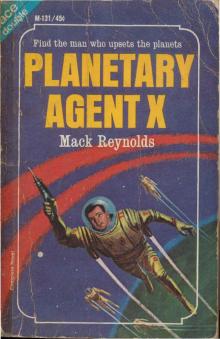 Planetary Agent X
Planetary Agent X Rolltown bh-3
Rolltown bh-3 The Second Mack Reynolds Megapack
The Second Mack Reynolds Megapack Dawnman Planet up-2
Dawnman Planet up-2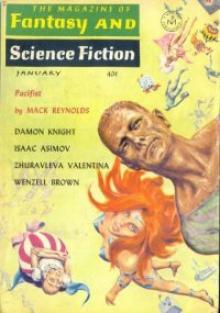 Pacifist
Pacifist The Other Time
The Other Time Once Departed
Once Departed IQ
IQ Computer War
Computer War Earth Unaware
Earth Unaware The Rival Rigelians up-3
The Rival Rigelians up-3 Brain World up-7
Brain World up-7 Star Trek - TOS - Mission to Horatius
Star Trek - TOS - Mission to Horatius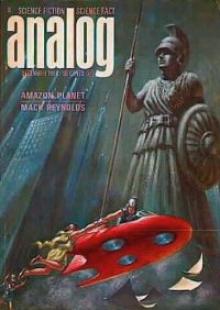 Amazon Planet up-5
Amazon Planet up-5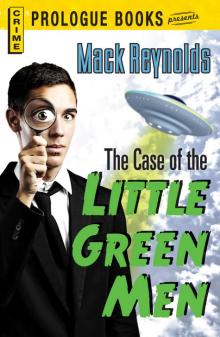 The Case of the Little Green Men
The Case of the Little Green Men Other Time
Other Time The Mack Reynolds Megapack
The Mack Reynolds Megapack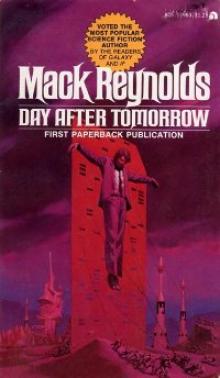 Day After Tomorrow
Day After Tomorrow The Devils & Demons MEGAPACK ®: 25 Modern and Classic Tales
The Devils & Demons MEGAPACK ®: 25 Modern and Classic Tales Mission to Horatius
Mission to Horatius Ability Quotient
Ability Quotient Galactic Medal of Honor
Galactic Medal of Honor Trojan Orbit
Trojan Orbit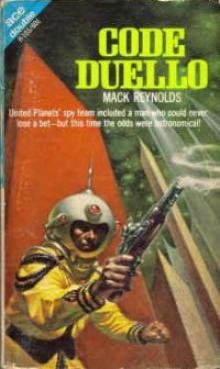 Code Duello up-4
Code Duello up-4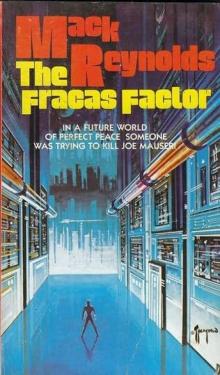 The Fracas Factor
The Fracas Factor The Second Pulp Crime
The Second Pulp Crime Deathwish World
Deathwish World Planetary Agent X up-1
Planetary Agent X up-1 Blackman' Burden na-1
Blackman' Burden na-1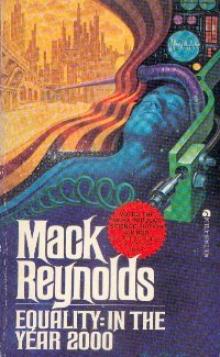 Equality: In the Year 2000 jw-2
Equality: In the Year 2000 jw-2 The Best Ye Breed na-3
The Best Ye Breed na-3 The Jet Set
The Jet Set The Rival Rigelians
The Rival Rigelians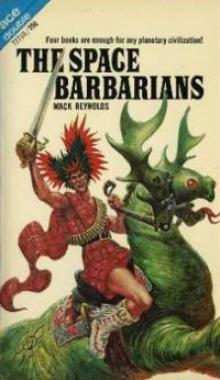 The Space Barbarians
The Space Barbarians